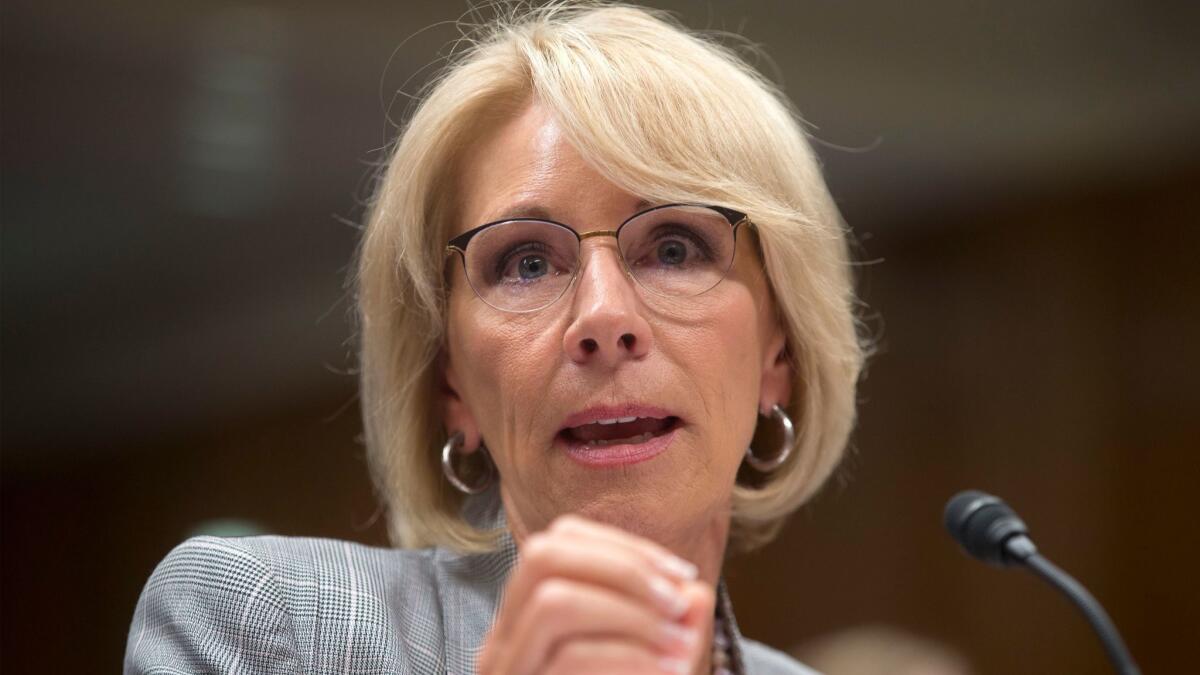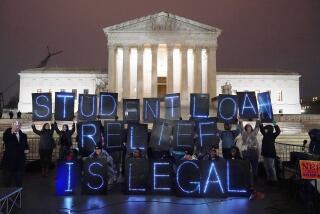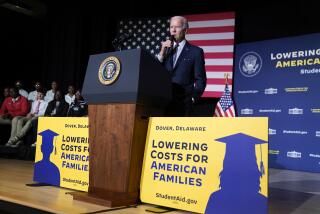Judge rejects DeVos’ interpretation of order about Corinthian student debt relief

Tens of thousands of former Corinthian Colleges students can breathe a sigh of relief after a federal judge said late Tuesday that the U.S. Department of Education must stop all attempts to collect on their federal student loans.
The decision clarifies the scope of the judge’s ruling in May banning the Education Department from using earnings data to grant partial student loan forgiveness to Corinthian students and halting collection on their federal debts. The agency interpreted the order to apply only to the four plaintiffs in the case, not the horde of Corinthian students defrauded by the defunct for-profit school.
To avoid any further confusion, Magistrate Judge Sallie Kim of the U.S. District Court in San Francisco handed down a detailed order Tuesday that applies to Corinthian borrowers who have already received partial forgiveness, those still awaiting a decision on their applications and people who have yet to submit a debt relief claim.
Kim said the order will remain in place until the court can determine the proper course of action, but noted that her ruling does not preclude Education Secretary Betsy DeVos from granting full relief to Corinthian students in the meantime.
The Education Department did not immediately respond to requests for comment.
The case stems from DeVos’ decision in December to provide debt relief to former Corinthian students by comparing the average earnings of students in similar vocational programs. That earnings information is collected under gainful employment, a regulation that penalizes career-training programs for producing too many graduates with more debt than they can repay.
The Project on Predatory Student Lending at Harvard University and the Housing and Economic Rights Advocates, legal aid groups representing the Corinthian borrowers, filed an injunction in March to stop the practice. They argued that the Education Department has no right to use the data, which is supplied by the Social Security Administration, for any purpose other than to evaluate vocational programs. The attorneys also said denying full relief to Corinthian students is illegal.
Kim agreed that the Trump administration violated privacy laws by using Social Security Administration data to calculate loan forgiveness, but she held off on declaring the partial relief scheme illegal.
“The Department of Education has now been rebuked in court not once, but twice for violating the rights of students it should be serving,” said Toby Merrill, director at the Project on Predatory Student Lending. “Corinthian ripped off hundreds of thousands of students, and the Department of Education is making it worse by collecting their illegal debts, prolonging their suffering.”
A federal statute known as borrower defense to repayment gives the Education Department authority to discharge federal student loans when a college uses illegal tactics to persuade students to borrow money. The agency has been inundated with applications since Corinthian folded in 2015 amid state and federal investigations and lawsuits over alleged fraud, deceptive marketing and steering students into predatory loans. (Corinthian was based in Santa Ana and operated schools under its Everest, Heald and WyoTech brands.)
The Obama administration was slow to respond to the flood of applications, yet it started to make headway before leaving office. That momentum ended when Trump came into power as his administration refused to take action on the mounting debt relief claims until education officials could fully review procedures instituted under Obama.
DeVos started processing claims again in December, announcing the approval of 12,900 applications and denial of 8,600 claims from former Corinthian students. She said applicants would receive full loan forgiveness if their earnings are less than 50% of those of their peers. If their pay is at or above that threshold, the department would provide relief on a sliding scale instead of full forgiveness.
According to court filings, nearly 9,000 Corinthian borrowers have been awarded partial relief as of April. Some applicants are getting only 10% of their loans written off, leaving them responsible for covering the balance.
“The department has the power and the obligation to do the right thing and immediately cancel the debt of cheated Corinthian borrowers, but if they continue to refuse to do it on their own, we will fight them in court until they come around,” Merrill said.
More to Read
Inside the business of entertainment
The Wide Shot brings you news, analysis and insights on everything from streaming wars to production — and what it all means for the future.
You may occasionally receive promotional content from the Los Angeles Times.










